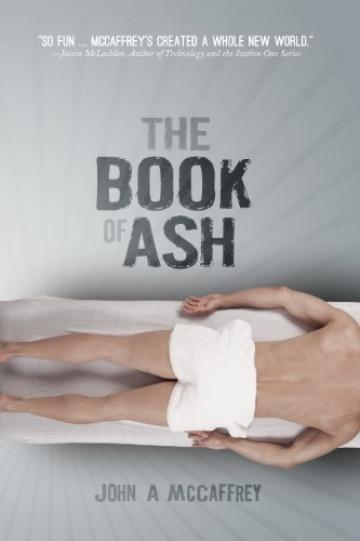Telling Tales: One Writer + One Focus = One Story - John McCaffrey
Telling Tales: One Writer + One Focus = One Story
My version of the ideal writing life includes: months-long stretches in a cottage on Cape Cod Bay; manuscripts completed without interruption by toilet overflows, grocery shopping, or piles of rank laundry. My real life is far from this perfect fantasy, but writers such as John McCaffrey prove that achieving writing goals is not impossible. The recent publication of Mr. McCaffrey's first novel, The Book of Ash (Boxfire Press, 2013), provided an opportunity to discuss how pragmatism can free creativity, get words on the page, and develop ideas into published novels. Following are edited excerpts from our exchange, part of a series of interviews I am doing for KGB that take an occasional look into pivotal moments in writers' lives.
Q. Your pragmatism as a writer and teacher is something I admire. A McCaffrey-ism that has stayed with and guided me over the past years is (I'm totally paraphrasing here), "You'll likely have more great story ideas than time to write them all. Consolidate when you can." I'm curious if that approach contributed to the decision to pursue the novel, i.e., one short story could not contain all of the ideas and themes in The Book of Ash. I'm also curious if some of these ideas and/or characters had been explored in past work.
I thank you for the compliment! For sure, pragmatism is a good label to be tagged with, much better than say plagiarism (I still say that 11th grade paper on quantum geo-physics was all mine), or for that matter McCarthyism (Senator Joe, not Molly from Bridesmaids). But the ‘ism' cited here, that the real challenge for writers is not finding stories to tell, but narrowing the field down to tell them well, seems logical to me – even freeing creatively.
Take the portrait photographer. Their usual method is to snap as many shots of a person as possible in a session, from every conceivable angle, under different lighting, hundreds of snaps just to get that one perfect picture. Writers are the same – we take in so much stimuli each day, visually, intellectually, emotionally, and our job is to cull through this pile of thought and feeling and extract the perfect idea for a story, or whatever creative project we want to undertake.
The key point is there is no such thing as a “perfect story,” just as there is no such thing as a “perfect picture” (sorry Project Runway). The only thing that can be perfect is the match between the idea for your story and what you are most interested in at that moment. This match-up will lead you to what you want to accomplish.
In my case, prior to getting the idea to write The Book of Ash, I had the idea that I wanted to write a novel; meaning, I had set my mind that I was going to write a full-length book before I knew what the book would be about. Then 9/11 happened, my marriage fell apart, and with it came a flood of ideas about love and loss, violence and healing, all of which I funneled into a novel. But one always has to be who they are – and for me, after years of writing only short stories, I was, when I started the book, a short story writer. Instead of fighting against this pull (or momentum), I tried to use it to my advantage, creating chapters with a traditional story arc – start, middle, end – that had the ability to stand alone but also meld together into a cohesive chain. Along with the writing style, the themes explored in many of my stories shared a core similarity with the novel, including surreal plot lines, absurdist humor, and an emphasis on the natural world.
Q. Your ability to develop and apply a practical process to achieve a writing goal is also admirable, e.g., stick to daily word maximums to keep the return to work exciting; explore and write in the morning, revise and refine in the evening. What process did you develop to write The Book of Ash? I'm especially interested if it was a departure, or not, from your story and flash fiction processes.
I actually worked with a writing coach for the first two drafts of the novel, Jill Dearman, who I highly recommend to anyone for this purpose. I went to Jill because even though I was determined to write a novel, it was not the first time I had made this announcement to myself...meaning, I had started on a few before and never finished. Having a writing coach (we meet bi-weekly) made the endeavor that much more serious, brought another stakeholder, so to speak, into the process. While Jill is incredible at giving feedback on character and plot and themes, it was her ability to keep me on track, to motivate me through the lag periods, and give me deadlines, that propelled the book forward. I found that I wrote the most right before I was to see her, choosing to produce pages rather than explain why I hadn't. In that case, I had deadlines within deadlines, a structure I needed.
One other thing I did was pick a word count – 70,000 – which I saw as optimal for the novel I wanted to write. With that as a goal, I ‘mathed' out how many words I needed to write a day, a week, a month, to finish the book in a year. In this regard, if I had a bad day of writing, or week, or month, I knew I had to step it up to get current with my goal. Conversely, if I had a strong day, week, or month, I could ease up a little. In some ways, I tried to take the creativity out of the writing process, which freed me to be more creative within it.
Lastly, I'm a great believer in reward...and knowing when to stop. This idea I stole from Hemmingway, who always said he stopped writing at the point where he knew what came next...that way, he could hit the ground running the next day (even if hungover). In my case, I would often start writing on the book at 10 pm, knowing that I would stop at 11 pm. to watch Seinfeld Reruns. The funny thing was that I always did my best writing at 10:55, hurrying up to finish so I could watch TV.
Q. What practical advice can you offer re: the selection of a publisher for The Book of Ash?
Be open to any publisher who likes your work, gets it, and wants to champion it. Judge them first on this quality: that they genuinely value your book and you as a writer. Everything else will fall into place from that. That said, it is wise to check their history, e.g., do they do what they say with books? What is their reputation? In today's internet age, a few journeys through Google will provide all you need to know about a publisher. In terms of getting a publisher interested in your work, it is part a numbers game, but just as much attitude. In some ways, it reminds me of meeting a romantic partner. It is all about timing, confidence, compatibility, and a bit of desperation.
Q. Now that you've completed the journey--the writing, revising, and publishing of a first novel--would you do it again? Would you advise others to do it?
Absolutely. There is always value in completing difficult challenges, sacrificing and struggling, even feeling hopeless and lost. It's like something I read the other day about how organic tomatoes are much better for you than non-organic varieties. Organic tomatoes have much more anti-oxidants than those treated with pesticides. The reason is that the organic tomatoes had to fend off parasites and disease on their own, and therefore had to build their defenses to these menaces. The ones sprayed with chemicals did not. Stress and threat, for lack of better words, made the organic tomatoes strong. And that strength translates into our pasta sauce and salsa. I believe it's the same with writing: going through the pain makes us stronger, and in turn our writing, what we give to our readers, is more beneficial and illuminating.
John McCaffrey graduated from Villanova University, and later received his MA in Creative Writing from the City College of New York. He will be reading from The Book of Ash at KGB Bar on January 12, 2014. Find out more at thebookofash.com or twitter: John A McCaffrey @jamccaffrey.

 Nancy Méndez-Booth is a fiction writer. She teaches writing and Latino/a literature and culture in New York and New Jersey. Her work has appeared in Jet Fuel Review, mamapedia.com, The Packinghouse Review, phat'titude Literary Magazine, Philadelphia Stories, Poets & Writers, and realsimple.com. She is looking for a publisher for Underbelly, a collection of linked short stories. She blogs regularly at
Nancy Méndez-Booth is a fiction writer. She teaches writing and Latino/a literature and culture in New York and New Jersey. Her work has appeared in Jet Fuel Review, mamapedia.com, The Packinghouse Review, phat'titude Literary Magazine, Philadelphia Stories, Poets & Writers, and realsimple.com. She is looking for a publisher for Underbelly, a collection of linked short stories. She blogs regularly at